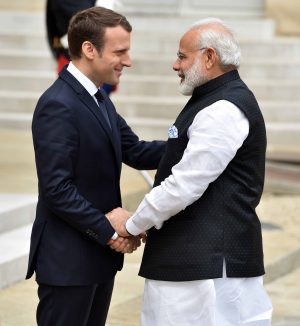The French Defense Minister Florence Parly is currently visiting India. While the nominal occasion for her trip is the induction of five newly acquired multirole Rafale combat aircraft into the Indian Air Force (IAF) today, it comes amid serious military tensions between India and China in Eastern Ladakh. Tweeting after the induction ceremony in the Ambala IAF base in western India, Indian Defense Minister Rajnath Singh pointedly linked the induction of the French-made jets with the ongoing India-China crisis.
Singh wrote: “The induction of Rafale is a strong message for the world and especially for those who challenge India’s sovereignty. The induction is a very important step in light of the prevailing security conditions that prevail, or I would say, that have been created along India’s borders.” That he did so while Parly was still in the country without apprehension of how France might feel about being referenced in the context of an India-China border crisis illustrates the comfort both sides have developed about their defense relationship.
India’s relationship with France is one of the country’s strongest. France was one of the first countries with which India signed a “strategic partnership” after the end of the Cold War, in January 1998. Beyond the purchase of 36 Rafale jets – some of which might form part of India’s nuclear air vector – in 2016, India entered into a contract with a French firm to build six Scorpene submarines in India’s Malegaon dockyards through a technology-transfer arrangement in 2005. Two of them have already been commissioned into the Indian navy while a third is undergoing sea trials. The two countries signed a military logistics agreement in 2018, among a handful India has so far. France was one of the very few countries to support India’s decision to test nuclear weapons in 1998.
At a more fundamental political level, Paris and New Delhi’s shared quest for strategic autonomy and close military relations with other powers have meant that the ideological baggage that has on occasion held back deeper India-U.S. defense cooperation has been absent in the relationship. As I wrote in these pages last year, “As New Delhi’s search for like-minded security partners (as a diversification strategy in the best reading, and insurance policy in the worst) acquire urgency, France has emerged as a natural choice in recent years.” Both China’s actions and America’s internal turbulence have served as natural propellants in the relationship.
The Indo-Pacific, the Indian Ocean in particular, where Paris has a considerable stake, has emerged as a key theater of common interest. After the 2018 logistics agreement, India and France are now exploring the possibility of a secure communications agreement which would allow navies of both countries to share maritime domain awareness information through protected channels. (The U.S. is the only country with which India has an arrangement of that nature so far, through the U.S.-India COMCASA agreement signed in 2018.) India, France and Australia held their first foreign-secretary-level trilateral dialogue by video link yesterday, marking the beginning of France’s involvement with India in emerging small groupings. In a statement about the dialogue, the Indian foreign ministry noted that “[t]he outcome oriented meeting was held with the objective of building on the strong bilateral relations that the three countries share with each other and synergizing their respective strengths to ensure a peaceful, secure, prosperous and rules-based Indo-Pacific Region.”
Yesterday’s trilateral dialogue and Parly’s visit both come during an extremely hectic time for Indian diplomacy, with New Delhi signaling its displeasure to Beijing about the ongoing tensions in Eastern Ladakh through a flurry of activities. At the start of this month, India, Japan, and Australia launched a “Resilient Supply Chain Initiative” to coordinate the diversification of supply chains in the Indo-Pacific, a not-so-veiled message to China that these nations have ways of mitigating the risks that China poses to the region’s economies. Earlier today, India and Japan signed a military logistics agreement along the lines India has with the U.S., France, and others. Finally, Indian media reports that Prime Minister Narendra Modi spoke earlier today with outgoing Japanese Prime Minister Abe Shinzo.
The Indian foreign minister, S. Jaishankar, is scheduled to talk with his Chinese counterpart Wang Yi in a highly anticipated meeting later today. Russian Foreign Minister Sergey Lavrov will join them both in a separate three-way conversation.
































